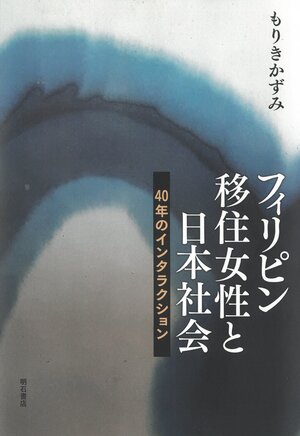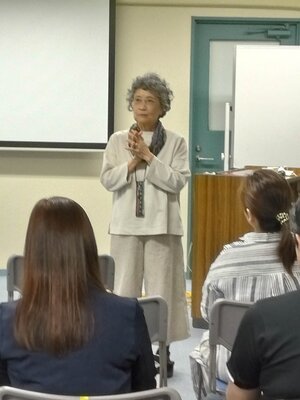- TOP
- 国際人権基準の動向
- FOCUS
- September 2023 - Volume 113
- Filipino Migrant Women and Japanese Society - 40 Years of Interaction
FOCUS September 2023 Volume 113
Filipino Migrant Women and Japanese Society - 40 Years of Interaction
I wrote a Japanese-language book to document the changes in Japanese society brought about by Filipino migrant women over the past forty years, from the time they first arrived in Japan to the present. In English, the title of the book is Filipino Migrant Women and Japanese Society - 40 Years of Interaction.
 I was involved in the founding of RINK (Rights of Migrant Workers in Kansai), a support group for non-Japanese workers in Osaka, in 1991. Japan did not accept non-Japanese workers at that time, and Filipino women repeatedly came to Japan as entertainers on short-term visa. Many were victims of human trafficking, and I began to receive more and more requests from them for counseling in Osaka.
I was involved in the founding of RINK (Rights of Migrant Workers in Kansai), a support group for non-Japanese workers in Osaka, in 1991. Japan did not accept non-Japanese workers at that time, and Filipino women repeatedly came to Japan as entertainers on short-term visa. Many were victims of human trafficking, and I began to receive more and more requests from them for counseling in Osaka.
In March 1994, I visited Manila for the first time. I visited Batis Center for Women, a non-governmental organization supporting women who had returned to the Philippines from Japan. I listened to their stories.
They complained of mental and financial instability due to abandonment by Japanese men, difficulties in caring for their children, and the search for the Japanese father of their children (Japanese-Filipino Children or JFC). I formed the Asian Women's Empowerment Project in Kobe to help find the Japanese fathers while also selling products made by these Filipino women in the Philippines as a fair trade activity. It was through these non-governmental organizations (NGOs) that I met and began my relationship with Filipino women. Consultations would come at each milestone in their lives: marriage, divorce, children and work. Through my interactions with these women, I was able to experience Japanese society from their side.
At present, Filipino women are indispensable in the field of nursing care; the JFCs have overcome many of the problems their mothers had faced and are beginning their own lives. The scope of Japanese citizenship has been expanded with the acquisition of Japanese citizenship for "children born out of wedlock."[1]
The struggle of each migrant woman in Japanese society and the social actions made to address the problems brought about changes in Japanese society. The social impact that the migration of Filipino women to Japan has had on Japanese society is not insignificant. New social relationships and frameworks have been created by the forty years of interactions experienced by the migrant women in Japan. I dug up from my memory and wrote down the trajectory of the forty years of Filipino women migrants in Japan.
Chapter I of this book, "Encounters with the Philippines ❘ Background on Migrant Women," identifies the problem I learned from encounters with Filipino mothers and children and interviews with Filipino migrant women, and discusses the activities of Japan-Philippines support groups dealing with the problem. Chapter II, "Asian Women and Children of International Marriages," examines the issue of "nationality," which is a major problem for women who come to Japan, meet Japanese men, give birth to children, and raise them. The author wonders where the "children of international marriages" belong, and whether Japanese society will accept them as Japanese citizens. This section contains three articles: "Asian Women and Children of International Marriages," written in 2001; "The Lawsuit to Confirm the Nationality of Children Born Out of Wedlock," written in 2004; and "Nationality and Gender: A Consideration of the Scope of Citizenship," written in 2012. The outcome of the court cases brought by the "children" over the acquisition of Japanese nationality ultimately diversified and expanded the scope of Japanese citizenship. Chapter III, discusses the trend of the life of Filipino migrant women who were increasingly settling in Japan for long periods of time and the changes in Japanese society in three phases (1980-1994 [encounters with Filipino migrant women], 1995-2007 [struggle for the human rights of migrant women], 2008-2020 [current situation as seen from the work and life of migrant women]), and considers what impact these changes have had on migrant women and Japanese society. Chapter IV summarizes the framework of new forms of non-Japanese acceptance (categorized under "Training", "Technical Training," "Specific Skills," "Nursing," "Nursing Care," "Housework Support") that have already begun.
Kazumi Moriki is currently a Coordinator for the Filipino community Masayang Tahanan in Kobe.
For copies of the book, inquire at Masayang Tahanan, 3F, Kobe Center for Overseas Migration and Cultural Interaction Bldg., Yamamoto-dori 3-19-8, Chuo-ku, Kobe-shi; ph (81) 78-862-6519; e-mail: mt4filmoms@gmail.com; www.facebook.com/filmoms.
[1] See 2006 (Gyo-Tsu) 135, Decision of the Supreme Court of Japan, Minshu Vol. 62, No. 6, www.courts.go.jp/app/hanrei_en/detail?id=955.

